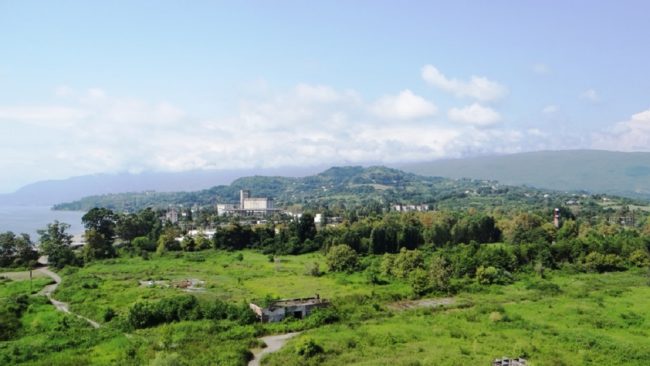


 A crime committed in the village of Nizhnyaya Eshera, where a young woman was killed and her underage sister was raped, sent shock waves throughout Abkhazian society and opened up a debate on the roots of violence against women.
A crime committed in the village of Nizhnyaya Eshera, where a young woman was killed and her underage sister was raped, sent shock waves throughout Abkhazian society and opened up a debate on the roots of violence against women.
Discussions about violence against women gained new impetus in the middle of June this year, when a 13-year-old girl was raped in a village not far from Abkhazia’s capital Sukhum, followed by the murder of her 23-year-old sister.
A former employee of the State Security Service of the President of Abkhazia, Astamur Dzhopua was accused of raping the 13-year-old girl who, according to local reports, was the sister of his girlfriend. Allegedly, the man drove to pick up his girlfriend but did not find her at home. In a fit of anger he pushed the sister into his car and went searching. Not finding his girlfriend, he raped the minor.
The man was arrested two days after the incident. Relatives of the girl claim that the brother of the accused, Member of Parliament Almas Dzhopua, attempted to settle the matter with the father of the girl, although the eldest daughter was insistent on telling the truth. The brother then tried to compromise her credibility and psychologically pressured the father by alleging that his elder daughter led an immoral life.
The body of the 23-year-old sister was found on 17 June. Her own father is suspected of shooting her. He is now wanted by the police. The relatives of the girl said they would not leave the matter before both men confessed their guilt. The case gained a particular poignancy, because the mother of the girl has filed a complaint against her husband.
On 19 June, president of Abkhazia Raul Khadzhimba held a meeting with heads of various security services and demanded an objective investigation.
‘No mercy, no excuses! The investigation should be held with all the potential consequences. And so that no one has thoughts of excusing anyone. There is a crime, and there should be an objective investigation according to the law’, he said.
According to information obtained by OC Media from the General Prosecutor’s Office in Abkhazia, at the moment, Astamur Dzhopua is held in temporary detention. An investigation is underway.
‘Women should know their place’
The crime has sent shock waves throughout Abkhazian society. Considering that both families are ethnic Abkhaz, many people have asked: to what extend did the local traditions embodied in the ethical code apsuara play a role in the tragedy?
Apsuara is a moral and ethical code of the Abkhaz people with pagan roots, regulating social relations, such as those within a family and those between men and women. The code also includes prohibitory principles. One of them is apkhashara, which means ‘shame’, and falls upon the one who breaks the rules accepted in the society.
OC Media talked to Daur Latariya, head of Apshatyp (‘sacred place’) Centre for spiritual renewal of traditions, rituals, religion, and traditional medicine on the basis of apsuara. He believes that the problems of modern society are rooted in the emancipation of women.
‘Before, they played the role of peacekeepers. When brothers quarrelled, their wives reconciled them. But now the women themselves instigate disputes. Coming home discontented, the husband does not hear consolations of his wife, but incitement to punish the offender. Also, very many women today sit in social networks and start quarrels there’, he said.
Latariya added that both men and women were responsible for what’s going on. ‘Both are guilty. But women must learn to pray everyday for their family, for Abkhazia, for the whole world. As it was before’, he continued.
A clash of civilisations?
Latariya’s opinion is not an exception, although the society as a whole does not have a consensus on what to do with rapists. Many believe that they should be lynched. Others think that a due process is necessary. Others say there is no law in the country anyway. And some absolve the rapists of the crime altogether.
Evidently, along with the sprouts of new secular views, traditionalism is very strong in Abkhazia as well. Despite the fact that urbanisation leads to the weakening of some traditions, some still value apsuara.
A testament to that are messages on social networks. For example the reactions to the rape and murder discussed in this article were: ‘Abkhaz will solve this case without cops and trials’ or ‘Why would we jail this pig, who shamed his family, brothers, kin? They should themselves catch him and execute him with their own hands’. Some also have said: ‘There was a time when he would have been judged according to apsuara. And it wasn’t empty talk. Now everyone is silent. It’s a pity that no one listens to our elders’.
Women’s attitude towards formal justice is also under the influence of traditional values. Psychologist Elana Kortua, who works with women that have suffered violence, tells OC Media that violence against women in Abkhazia is a frequent occurrence, but women hide such facts for fear of ‘shame’. It is considered more appropriate to settle matters inside the family. She adds that even after filing complaints to the police, often women retract them because investigations involve lengthy procedures to establish evidence of violence, which is another cause to fear public shame. It is difficult for women to admit that they indeed need help, especially because there is no law on domestic violence in Abkhazia.
In addition, there are still cases when girls are driven out of families or even brought to suicide. ‘Very often, girls are deliberately brought to suicide. Relatives talk about the shame of the family name, clan, loss of respect in society. Thus, the relatives have their hands “clean”, because the girl supposedly kills herself, and the family’s shame is “washed away”. But we know that the person was simply forced to do it. No one has the right to perpetrate that’, Kortua says.
Interpretation matters
Employee of the rights group Centre for Humanitarian Programmes Liana Kvarcheliya told OC Media that there is nothing in common between apsuara and violence: the perverted understanding of customs is unrelated to the Abkhaz value system.
According to her, the problem is a lax attitude towards the law. In turn, this attitude is caused by a lack of possibilities, a high level of aggression and impunity.
‘If a person knows that there is no punishment for murder, then it doesn’t matter if it’s a custom or not, because in a country where the law works, he will be put to jail. But here, because of the neglect of the rule of law and the feeling of impunity, a person’s life has lost value. Had the law worked and had the law enforcement been effective, then I think there would be no such cases in Abkhazia’, Kvarcheliya asserts.
She is sure that the decision of the father to kill his daughter, who ‘shamed’ their family name, has no relation to the moral code apsuara.
‘I think that traditional Abkhaz values now have a perverted interpretation. Killing a woman is not a part of our value system. Yes, we have had vendetta. But this has actually stopped many people from doing something without thinking, like offending someone or doing something cruel, because they understood that it could lead to a sad finale. To preserve our culture, we must talk to people and explain where our true traditions lie, and which elements are exported and are alien to Abkhaz culture’, Kvarcheliya believes.
The Council of Elders and civil law
The Council of Elders of Abkhazia declared its support for civil justice and the law enforcement agencies.
‘The incident has left no one unmoved. But we shouldn’t draw any hasty conclusions and blame anyone without evidence. There must be an investigation led by law enforcement’, said the Council’s leader Apollon Shinkuba.
He disagreed with the accusations directed against the Council: ‘We are accused of inaction, of the fact that we did not come to parliament where women initiated a discussion on the criminal situation in the country and the rape of the girl. Nobody invited us there, and I do not have the habit of going to places where I’m not invited and where my opinion is not interesting. I consider reproaches in our direction unfair. We held different meetings, talked with people, including representatives of the Dzhopua family’.
Shinkuba also said that the Dzhopua family condemned their relative and cannot consider him a part of their family any more. He urged not to judge the whole family by the actions of one of its members.
Another member of the Council, Apollon Dumava, called the incident ‘shameful to Abkhazia’.
‘An investigation is underway, we are not judges or prosecutors, but we must give this incident an evaluation. Such cases are an unforgivable shame, it negatively affects not only the family, the surname, but the whole republic’, he said.
[Read on Chai Khana: Abkhazia: The violence no one admits exists]
This article was prepared in partnership with Civil.ge with funding from COBERM. All place names and terminology used are the words of the author alone, and their opinion may not necessarily reflect the views of the editorial boards of OC Media or Civil.ge.








